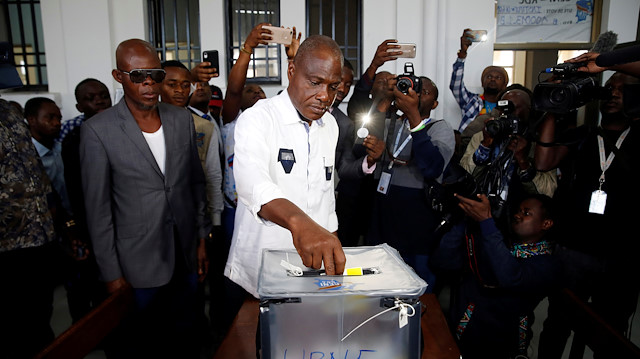
Five mining executives contacted by Reuters said they were not yet operating on the assumption that Tshisekedi's win would be validated by the Kabila-appointed Constitutional Court and expected the outgoing president to fight to keep his stranglehold on the sector. None wanted to speak on the record.
Companies could find themselves caught in the crossfire of turf wars over ministry jobs and positions in the bureaucracy, not knowing who is really in charge.
"There are always people you have to sway if you want a contract or a mining permit," Stearns said. "At the top, these are Kabila's people. That's now going to be in a state of flux that, I think, is going to last months."
Even if Tshisekedi's win is validated, Kabila's influence is unlikely to disappear.
Supporters of Fayulu, who was declared runner-up, allege Tshisekedi's victory grew from a backroom power-sharing deal struck with Kabila and are challenging the result in court. Tshisekedi and Kabila’s camps deny any such deal.
A Catholic Church observer mission concluded Fayulu was the clear victor, diplomats briefed on its findings said. Belgium and France also questioned the result.
Kabila's allies retain a parliamentary majority, and with it the right to name the prime minister, according to results announced on Saturday, making it unclear who will control key posts. While the president formally appoints ministers, those names are proposed by the prime minister.
"You wield power in Congo via the power of appointment, and what I'll be looking at is who gets put where," said Gregory Mthembu-Salter, a former U.N. sanctions monitor in Congo who now heads Phuzumoya Consulting, which advises on due diligence and supply chains.
Despite the political uncertainty, Congo's mineral wealth remains a draw for mining firms. As well as its cobalt reserves, it is Africa's biggest copper producer and also mines gold and diamonds.
A day after the election results were announced, companies announced two mining transactions which could help bring concessions into production.
Australia’s Vector Resources acquired a 60 percent stake in the Adidi-Kanga Gold project in Ituri province. And AIM-listed Armadale Capital sold its Mpokoto gold project to Arrow Mining and African Royalty.
A source involved in the Adidi-Kanga transaction said that government approvals for the deal were secured long before the election. Communications consultants for Armadale said work on the Mpokoto deal began in 2016.
Tshisekedi will need a functioning mining sector to raise revenues and, importantly, ensure the army is paid. Clawing revenue streams back from Kabila's patronage networks would help consolidate his position, as would improving governance to help attract new investors.
Under Kabila, Congo lost at least $1.36 billion in potential revenues from 2010-2012 alone due to cut-price asset sales to offshore companies, according to a panel led by former U.N. Secretary General Kofi Annan. Campaigners say the trend has continued.
A review of the most controversial deals of the past decades could also help Tshisekedi prove to the Congolese people that he's his own man, analysts said.
"Maybe Tshisekedi will set out and try to clean things up," said Ryan Cummings, director of business intelligence firm Signal Risk. "But I'm not sure I'd put any money on it."


















